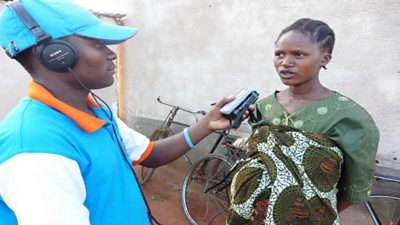Downloads
During my first pregnancy I used to throw away the blood increasing pills because I didn’t know the use of it. Now I am in my second pregnancy and I started attending the clinic after hearing this PSA. At the clinic I am given blood increasing pills, I am taking them daily.
Published: August 2015
Summary
seeks to improve maternal and child healthcare practices in the areas of antenatal care, exclusive breastfeeding and complementary feeding. A qualitative study in March 2015 showed that the PSAs produced by local radio stations with the support of ����ý Media Action contributed to increasing knowledge on the importance of the recommended practices, to shift attitudes, especially amongst key influencers in the household, and resulted in positive shifts in uptake
Context
The nutrition project is Africare’s flagship nutrition project which supports the government of Tanzania by aiming to improve the nutritional status of Tanzanians through the National Nutritional Strategy, the Tanzania Agriculture and Food Security Investment Plan, and other relevant policies.
����ý Media Action contributed to the objectives of the programme through local radio station partnerships and audience-centred research and learning.
����ý Media Action mentored local Tanzanian radio stations to write and produce PSAs that stress the importance of maternal and child healthcare practices. The impact of this work was assessed by measuring changes in knowledge, attitude and practices about child health and nutrition.
The project
Mwanza Bora is a five-year integrated nutrition programme implemented by a consortium, led by Africare and funded by USAID in Tanzania. ����ý Media Action supported Mwanzo Bora's social and behavioural change activities by mentoring three local radio stations to produce PSAs on health and nutrition. The three PSAs were based on the following behavioural outcomes: seeking early antenatal care, exclusive breastfeeding for the first six months and complementary feeding of babies over six months. Dodoma FM (Dodoma), Habari Njema FM (Manyara) and Ulanga FM (Morogoro) broadcast the PSAs from 6 February 2015 until 30 March 2015 at several times during the day.
Research approach
A qualitative research study was conducted with a total of nine focus group discussions across gender groups and the three regions where the PSAs were broadcast (Dodoma, Manyara, Morogoro). Three focus group discussions were conducted for each PSA with women (pregnant or with children under two years old); men (pregnant spouse or children under two years old); and female mixed groups (mothers and mothers-in-law).
Data from the focus group discussions was then triangulated with in-depth interviews with key stakeholders including community health workers and village officers in all three regions.
Implications and impact
This study showed that audiences thought the PSAs improved their understanding of the importance and benefits of the recommended practices. It also contributed to shifting beliefs amongst spouses and key influencers such as mothers and mothers-in-law and allowed for discussion on these matters.
These factors, and the view that the information was consistent with some of the information given at the clinic, reinforced the importance of these practices and resulted in some audiences putting into practice these behaviours.
However, some barriers, such as affordability to provide a child with a diverse diet and prevailing male attitudes, continue to be important obstacles in improving healthcare practices.
Findings
- Audiences indicated that they found the PSAs to be trustworthy and credible as the information provided was consistent with that received at local clinics
- Including male characters in the PSAs was found to be particularly engaging for audiences, especially women, who thought it was important in shifting male attitudes and supporting women’s ability to adopt the recommended health practices.
- The PSAs communicated new knowledge to some but played a bigger role in reinforcing existing knowledge by providing details about the recommended practices and their implications.
- An additional level of authority and credibility was provided by the PSAs to the practices that audiences had already heard about from their health practitioners.
- The PSAs were able to address knowledge gaps amongst key influencers, mainly mothers, mothers-in-law and husbands. This was seen by women as an important step for them to be able to follow the recommended practices.
- Audiences, especially women, were more likely to engage in discussion on the issues covered in the PSAs within the household and also between friends, neighbours and communities. This finding was reinforced by key stakeholders who indicated that more females were discussing the practices with them as well.
- The PSAs contributed to relevant behavioural changes in all three healthcare practices or provided the incentive to do so by discussing the benefits for mother and child. This was corroborated by village officers and community health workers who reported seeing a shift in practices.
- Some key barriers to adopt the healthcare practices remain despite the PSAs. These are:
- Antenatal care – certain attitudes which do not encourage men to get involved in what are seen as ‘women’s matters’.
- Exclusive breastfeeding – women’s workload and the belief that women are not getting a diet healthy enough to enable them to exclusively breastfeed.
- Complementary feeding – affordability for families to provide diverse foods for their babies.
